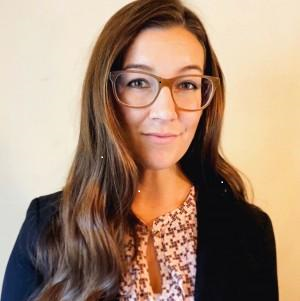Blog Post
A Day in the Life of a CRA during COVID-19: An interview with Raquel Telfer
November 13, 2020
“The best piece of advice I can give others during this time is to never underestimate the power of positivity.”
Raquel Telfer, Senior Clinical Research Associate at Rho, has been in the clinical research industry for over 10 years. She is currently working on a cystic fibrosis study and travels throughout the country monitoring clinical sites to ensure testing and data integrity.
We chatted about the generalities of living in the midst of a pandemic riddled state. Raquel acknowledged that she didn’t know anyone who had COVID-19 when we first heard about the pandemic in March, none of the site staff she works with have had it, nor any friends or family members. The same can’t be said today and that reality has hit closer to home, creating a constant awareness that colors her daily decisions, once taken for granted. Raquel speaks candidly about her experience as a CRA, provides examples of how the clinical landscape is evolving for CRAs and patients, and how she finds energy and inspiration during these unsettling times.
Travel is an integral part of the CRA role so let’s begin by discussing specifics surrounding how COVID-19 has impacted traveling for you.
Actually, it’s been hassle-free! I love the travel. I resumed a normal travel schedule at the end of May, after a few weeks of working remotely. At the Nashville airport, parking was much more accessible than before the pandemic, there were no lines for security checks, which resulted in on-time boarding, and as you might expect, less people were travelling. I use an airline that keeps the middle seats unoccupied which makes me feel a bit more protected from contracting the virus. Limited flight options are one of the caveats to the current travel landscape and I find that in certain parts of the country I have to extend overnight travel to accommodate for departure travel times that don’t allow me enough time to complete my day at the site and still make a flight to my next destination within the same day.
How have COVID-19 safety measures changed the way you travel?
Traveling looks different than ever before, but I feel safe. In addition to wearing a mask at all times and maintaining social distancing, I am vigilant about my daily preventative health regimen, which includes a variety of vitamins and supplements proven to keep my immune system boosted. I keep a supply of PPE on hand, including face shields and gloves provided by Rho, but renting a car instead of taking public transportation and staying in familiar hotels are other preventative measures that make me feel more comfortable in my travels. I preplan for the lack of healthy food options by packing snacks (CLIF BAR is my personal favorite!) to mitigate the sporadic hours of restaurants in town and at airports.
We hear a lot of chatter on how the pandemic has impacted the clinical trial sites. Are site staff more limited?
I haven’t noticed less staff, but staff scheduling has changed. With the option to work from home available, there are a limited number of staff on site every day. Due to the confidential nature of clinical information and the need for procedures, many resources aren’t available from home so there may be slight delays to get tasks completed, such as IP accountability. This must be captured on site – it doesn’t impact the trial, but it does impact getting the product back to the depot.
Are there new procedures at certain sites you must now follow?
On site, I usually work in a small room by myself. Two weeks in advance of a site visit, I request to be on site and once the approval is processed, the site sends me a notification of approval. I bring my own thermometer on visits for self-checks and site staff check my temperature before entering the site.
Specific site changes:
Sites are really on the ball with prevention and I’ve noticed an increased use of goggles in addition to wearing protective gear. The study protocol requires two aerosol generating procedures as part of each study visit and the sites offer several collection methods to ensure patient safety, including:
- At home collection for both procedures
- Drive-up service where the patient remains in the car
- On-site visits for Spirometry testing where site staff are nearby coaching the patient from outside the door
- On-site visits conducting testing in rooms specially equipped with HEPA filter or atmospheric negative air pressure
All patients must have a COVID test 24-48 hours before they are allowed to come on site for their study visit. The study coordinator performs the tests in the drive-up scenario. One thing to realize is that the cost of these tests have impacted study site budgets, which the sponsors willingly reimburse to keep the clinical research development ongoing.
The FDA recognizes the need to advance non-COVID research as well, by allowing for additional deviations, missed procedures, and visit windows to accommodate for COVID restrictions. Additionally, remote monitoring is becoming more common, and replacing some onsite visits at this point.
Are processes more electronic now?
Clinical monitoring has been transitioning with the widespread use of remote/electronic approaches, particularly with the rise of decentralized trials, and these strategies are becoming normalized. Site staff are able to upload large PDFs for monitoring capabilities through electronic data capture systems (EDC) or use Rho’s proprietary system for source document uploads. I’ve seen more creativity evolve; sites are contracting vendors to perform home visits for study-related procedures, making it easy to get transmitted cellular data directly through the vendor portal.
Are there new findings/different conversations you are having while onsite?
Many of our conversations revolve around COVID related deviations and restrictions. These discussions transfer over to the monitoring reports which now include COVID related changes.
We asked Raquel for a quick rundown of her favorites:
Favorite meal: Cheese pizza (local Neapolitan pizza place or Domino’s deep dish)
What you miss most pre-pandemic: Workwise, it’s the human interaction. Since I work remotely, the site staff are my closest coworkers. In my daily life, I miss the consistent school schedule for my 13-year-old daughter. I also miss events like live music and festivals.
Favorite book: The War of Art (for any artsy person overcoming resistance to be a creator). I highly recommend the audio version; the narrator is excellent. If you’re an artist or creator this is a must read.
What energizes you: Nature. Almost every day I find a trail to go running. When I travel, I like to find greenspace. I find it rejuvenating to be among the trees.
Best piece of advice/tips tricks learned related to COVID and traveling: Balancing life/work. You need to keep a sharp mind on site. Here’s what keeps me solid on all fronts: 7-8 hours of sleep, good food that comes from the colors from the earth every day and sunshine! A routine every day goes so far! Positivity – never underestimate the power of positivity.
 Raquel Telfer, Senior Clinical Research Associate at Rho, is based in Nashville, Tennessee. Raquel graduated from Creighton University in Omaha, Nebraska, with a degree in Biology. She stays busy with her 13-year-old daughter, a horse, and two cats. Raquel loves living in “Music City,” where she plays live music with a trio. In fact, she’s been songwriting and playing guitar and piano for about 13 years, and even has a few of her creations out on Spotify/Pandora/iTunes/etc.! She also enjoys competing in running and triathlon events and especially loves the outdoors, hiking, and camping.
Raquel Telfer, Senior Clinical Research Associate at Rho, is based in Nashville, Tennessee. Raquel graduated from Creighton University in Omaha, Nebraska, with a degree in Biology. She stays busy with her 13-year-old daughter, a horse, and two cats. Raquel loves living in “Music City,” where she plays live music with a trio. In fact, she’s been songwriting and playing guitar and piano for about 13 years, and even has a few of her creations out on Spotify/Pandora/iTunes/etc.! She also enjoys competing in running and triathlon events and especially loves the outdoors, hiking, and camping.
Interested in Joining Our Team?
We believe in collaborative relationships, yielding incredible results and a positive impact. Search our open opportunities today.

